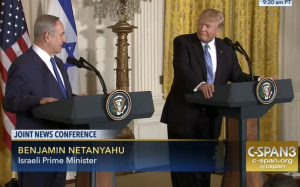The bullying and boasting that brought electoral success to Donald Trump may prove disastrous for the Middle East.
Emboldened by Trump’s victory, Israeli Prime Minister Benjamin Netanyahu is dramatically expanding settlements in occupied territory, in defiance of international law.
Until recently, the U.S. and Israel’s long-stated goal was having Jewish and Palestinian states existing side-by-side. But at a joint news conference at the White House Wednesday, Trump and Netanyahu changed course.
Trump was nonchalant about a two-state versus one-state solution. “I like the one that both parties like,” he said. “If Israel and the Palestinians are happy, I’m happy with the one they like the best.”
“He has no idea what’s going on,” Palestinian-American activist Linda Sarsour said at a protest outside the White House Wednesday evening.
There was one moment at the news conference when Trump attempted to push back on Netanyahu. “I’d like to see you hold back on settlements for a little bit,” Trump said. The prime minister offered no commitment to do so.
“There has been no U.S. administration that has been able to hold Benjamin Netanyahu and his government accountable for freezing settlements,” said Sarsour. “I don’t believe that… Trump is going to be able to do it.”
Providing few specifics, both leaders expressed optimism that peace could be achieved by bringing in neighboring Arab countries. But Trump’s month, and Netanyahu’s years, in office call into question their ability to bring together a diverse coalition.
One of Trump’s first major acts as president was to ban travel to the U.S. from seven majority-Muslim countries. The ban was met with mass protests and overturned in court. But Netanyahu was in full support.
“President Trump is right,” Netanyahu tweeted. “I built a wall along Israel’s southern border. It stopped all illegal immigration. Great success. Great idea.”
President Trump is right. I built a wall along Israel's southern border. It stopped all illegal immigration. Great success. Great idea 🇮🇱🇺🇸
— Benjamin Netanyahu (@netanyahu) January 28, 2017
Trump and Netanyahu are meeting at a time when both leaders are plagued by scandal. Perhaps hoping to prop each other up, the two have gone out of their way to support one another.
Even before occupying the Oval Office, President-elect Trump lobbied for the U.S. to veto a U.N. Security Council vote condemning Israeli settlements. But President Obama, ignoring Trump and Netanyahu, broke with the past practice of shielding Israel from international condemnation. The U.S. abstained on the measure, which passed 14-0.
“As to the U.N.,” Trump promptly responded on Twitter, “things will be different after Jan. 20th.”
As to the U.N., things will be different after Jan. 20th.
— Donald J. Trump (@realDonaldTrump) December 23, 2016
Things aren’t just different at the U.N.
For U.S. ambassador to Israel, Trump tapped an extremist with limited experience – apart from serving as Trump’s personal bankruptcy lawyer and fundraising for an illegal Israeli settlement.
“Bankruptcy law and involvement with settlements are not normally seen as… appropriate qualifications for the job,” former U.S. ambassador to Israel Martin Indyk told the New York Times.
The newspaper noted that Trump’s pick for the position, David Friedman:
accused President Obama of “blatant anti-Semitism,” dismissed the two-state solution to the Israeli-Palestinian conflict, likened a liberal American-Jewish group to “kapos” who cooperated with the Nazis, and said American Jewish leaders “failed” Israel on the Iran nuclear deal.
Friedman, whose Senate confirmation hearing is scheduled for Thursday, “might as well be the Israeli ambassador to the U.S.,” quipped veteran Middle East journalist Robert Fisk.
In a move that could enflame the Middle East, Friedman and Trump vowed to relocate the U.S. embassy from Tel Aviv to Jerusalem, a holy city for both Palestinians and Jews.
The move “would cause even greater turmoil in the Middle East [and] jeopardize, I think, the safety and security of U.S. embassies all over the region,” said Ann Wright, a retired U.S. Army colonel, as she protested with Codepink outside the State Department ahead of Netanyahu’s dinner there Tuesday. “I think it would be a very terrible, terrible thing for him to do.”
Trump didn’t back away from the idea Wednesday. “As far as the embassy moving to Jerusalem, I’d love to see that happen,” he said. “We’re looking at it with great care.”
Meanwhile, both Netanyahu and Trump continued their practice of railing against Iran. “One of the worst deals I’ve ever seen,” Trump said of the six-nation nuclear agreement signed under Obama. Netanyahu – who went to extraordinary lengths to kill the deal, even attacking it before a joint session of Congress – called Trump’s confrontational approach to Iran “long overdue.”
In the front row at Wednesday’s joint appearance was Trump’s son-in-law, Jared Kushner, who the president may name as special envoy to the Middle East. While some see the 36-year-old as a voice of moderation, his family ties to Netanyahu run deep.
In preparation for his 2007 campaign, Netanyahu drew up a private list of donors to hit up. Near the top was Charles Kushner, Jared’s father. And when Netanyahu previously visited the U.S., the Times reported he “stayed at the Kushners’ home in New Jersey, sleeping in Jared’s bedroom. (The teenager moved to the basement that night.)” Like Friedman and Trump, the Kushners have also supported illegal Israeli settlements.
Jared Kushner is “definitely not a moderating voice,” said Ethan Miller, an organizer with the Jewish group If Not Now, as he and other activists marched from Trump Hotel to the White House. “He’s an extremist when it comes to supporting and expanding the occupation.”
Back at the news conference, an Israeli reporter questioned the “sharp rise in anti-semitic incidents” in the wake of Trump’s campaign. The president, who is supported by the racist alt-right, had little of substance to offer.
Coming to Trump’s defense, Netanyahu said, “There is no greater supporter of the Jewish people and the Jewish state than President Donald Trump.”


